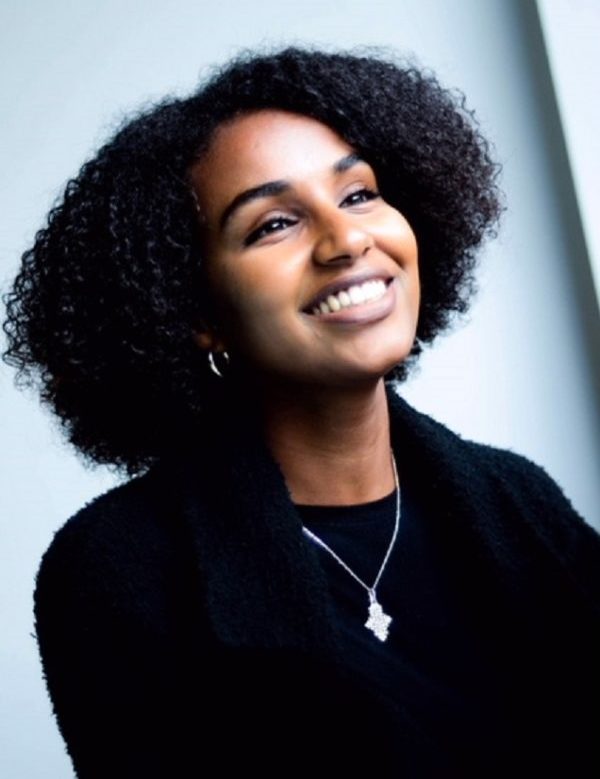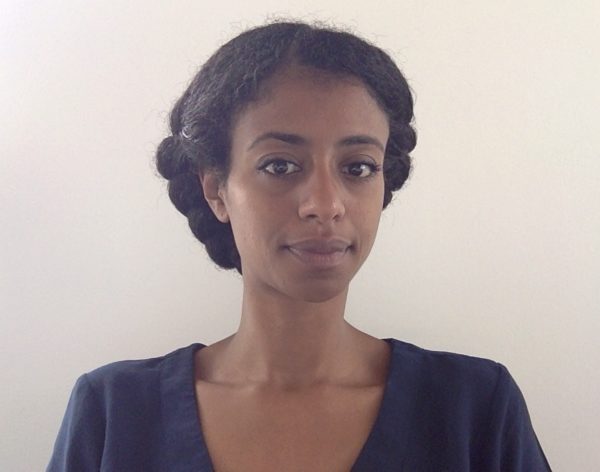
In 2017, an exciting, unusual initiative called Market FiftyFour was launched. The project publishes and markets work by African writers in their own languages rather than in English, French, or Portuguese. The publications are in e-book and audio formats, purchasable via online payments. Its belief is in “the potential of a new generation of Africans with access to local language literature.”
Market FiftyFour is run by Marthe van der Wolf and Melat G. Nigussie, both Ethiopian. Van der Wolf, who is the managing director, has worked as a foreign correspondent and communications consultant, and has an online delivery startup. Nigussie, the editorial director, is a project coordinator and freelance contributor.
The first book from the project is a collection of four stories titled Sheekadii Noloshayada—its English translation is titled The Story of Us—by the Somali writer Hanna Ali whom we have published. It arrived in October 2017 and is available, in book and audio, for $3.50. This makes Ali—currently a PhD candidate at School of Orientalism and African Studies, University of London—the first Somali to have her debut first published in their language. Market FiftyFour describes her book this way:
Hanna’s words depict the different phases of a young girl’s life, shifting perspectives from a refugee girl in Sweden to a grown woman in England trying to find comfort in her own body, and a Somali woman stuck in a loveless marriage. Hanna pushes the envelope and expands the limits of literature, both stylistically and thematically. Her unflinching narratives never shy away from controversial topics, as is the case in “A Kind of Love” where she explores the sexual relationship between a young Muslim girl and a white British nationalist.
Market FiftyFour’s out-of-the-box idea to address a problem that would have been unsolvable within the continent’s current publishing structures has been a welcome one, receiving mentions from BuzzFeed, BBC, and Integration TV.
We caught up with Melat G. Nigussie and Marthe van der Wolf via email to discuss the project and what it means for the publishing scene on the continent.

INTERVIEWER
Market Fifty-Four is an unusual project. You publish e-books and audios of writers’ works in African languages rather than in English. You belief strongly in the literary consumption capacity of the continent’s non-European languages speakers. How did the idea for Market Fifty-Four come about?
MARTHE VAN DER WOLF
The idea for Market FiftyFour originated in Ethiopia, my country of birth. My younger sister loves to read but finding books that are interesting for teenagers and students written in her native tongue is a real challenge, despite the fact that her language is spoken by millions of people. She finished reading the limited selection of books in the library years ago. There is just no means of getting access to local language books as there are few to none being published. Limited access to stories means millions of Africans will never be exposed to new African literature and thousands of African storytellers will never be discovered. There are some cool publishers trying to change that, such as Midako Publishing in Ethiopia. They publish children’s stories in several Ethiopian languages and they are really at the forefront. But on a pan-African level, there are few local language books, especially for the millennial generation.
INTERVIEWER
Market Fifty-Four has inserted itself into the long conversation on whether African literature should be written first in African languages. Ngugi wa Thiong’o is the face of this conversation. Market Fifty-Four can be viewed as a 21st century response to his ideas. How do you engage with his views on that?
MELAT NIGUSSIE
Ngugi wa Thiong’o represents a very important movement in African literature, and Market FiftyFour in a way follows his perspective by giving priority to African languages. Our platform aims to empower African literature in African languages, because language is not solely a communication vehicle but is inextricably linked to one’s culture, heritage and identity. Unfortunately, African languages are still deemed inferior, and with Market FiftyFour we want to challenge this idea that originated from colonialism but lives on in the mind of many Africans and non-Africans.
On the other side of the language debate, you have Chinua Achebe who chose to write in English and believed that it didn’t matter what language you wrote in, as long as it was good.
Market FiftyFour combines both these visions: we believe in writing and publishing in African languages but, at the same time, we can’t deny the reality of post-colonial Africa and the importance of English. That’s why we also publish in English, but our main focus lies on African languages. So, you could say we succeeded in reconciling Ngugi wa Thiong’o and Chinua Achebe’s perspectives.
INTERVIEWER
How did you engage, when beginning this project, with the reality that some speakers of African languages on the continent are not well versed in reading in their own languages? The audio can solve this, of course, but then it would have taken precedence over the written word. Do you find this problematic?
MARTHE VAN DER WOLF
That is exactly why we believed the audio version is just as important. We believe it’s all about sharing stories. Whether its recorded or written down, the stories are still documented. The format doesn’t really matter much in our opinion.

INTERVIEWER
Here at Brittle Paper, we’ve published Hanna Ali’s work; a flash fiction piece, “Broken,” and a poem, “Being Black.” What drew you to her work? What made it appealing enough for you to decide to kick off your project with it?
MELAT NIGUSSIE
We wanted to kick off Market FiftyFour with Hanna Ali’s work because her narratives are characterized by authenticity, honesty, and have a refreshing rawness to it. As a writer, Hanna doesn’t shy away from controversy and you can really tell that there is no self-censorship involved whatsoever. All the complexities of Somaliness, blackness, womanhood, family, religion and so much more are explored in her heart-wrenching stories. So, authenticity was really a decisive element for us, and also the opportunity to be able to uplift and celebrate the Somali language and Somali culture. Somalia is often referred to as a “nation of poets,” and Market FiftyFour wanted to do the country’s status justice by having Hanna Ali’s ephemeral poetic prose as our pilot release.
INTERVIEWER
Market Fifty-Four has received mentions from BuzzFeed, BBC, and Integration TV. How has the reception being?
MARTHE VAN DER WOLF
The reception has been really positive so far. Hanna’s writing is exceptional so that obviously helps. We are really grateful for the positive reception and hope that Market FiftyFour in the long run can contribute to making African language stories accessible and affordable for mainstream Africans on the continent and in the diaspora.
INTERVIEWER
Who is the next writer forthcoming in your project?
MARTHE VAN DER WOLF
We have a big name publishing a collection of short stories this summer with Market FiftyFour. We are very excited about that and will announce that soon. At the same time, we keep looking out for talent and accept submissions. Another project we are very excited about is the collection of African tales from different countries in local languages in 2018. We won’t be able to cover all countries this year but that is obviously our aim in the long run.
INTERVIEWER
Is there a future plan to publish books in print?
MARTHE VAN DER WOLF AND MELAT NIGUSSIE
There are no such plans for the foreseeable future.
INTERVIEWER
We wish you the best of luck!
Visit Market FiftyFour’s Website and check out Hanna Ali’s The Story of Us.









COMMENTS -
Reader Interactions